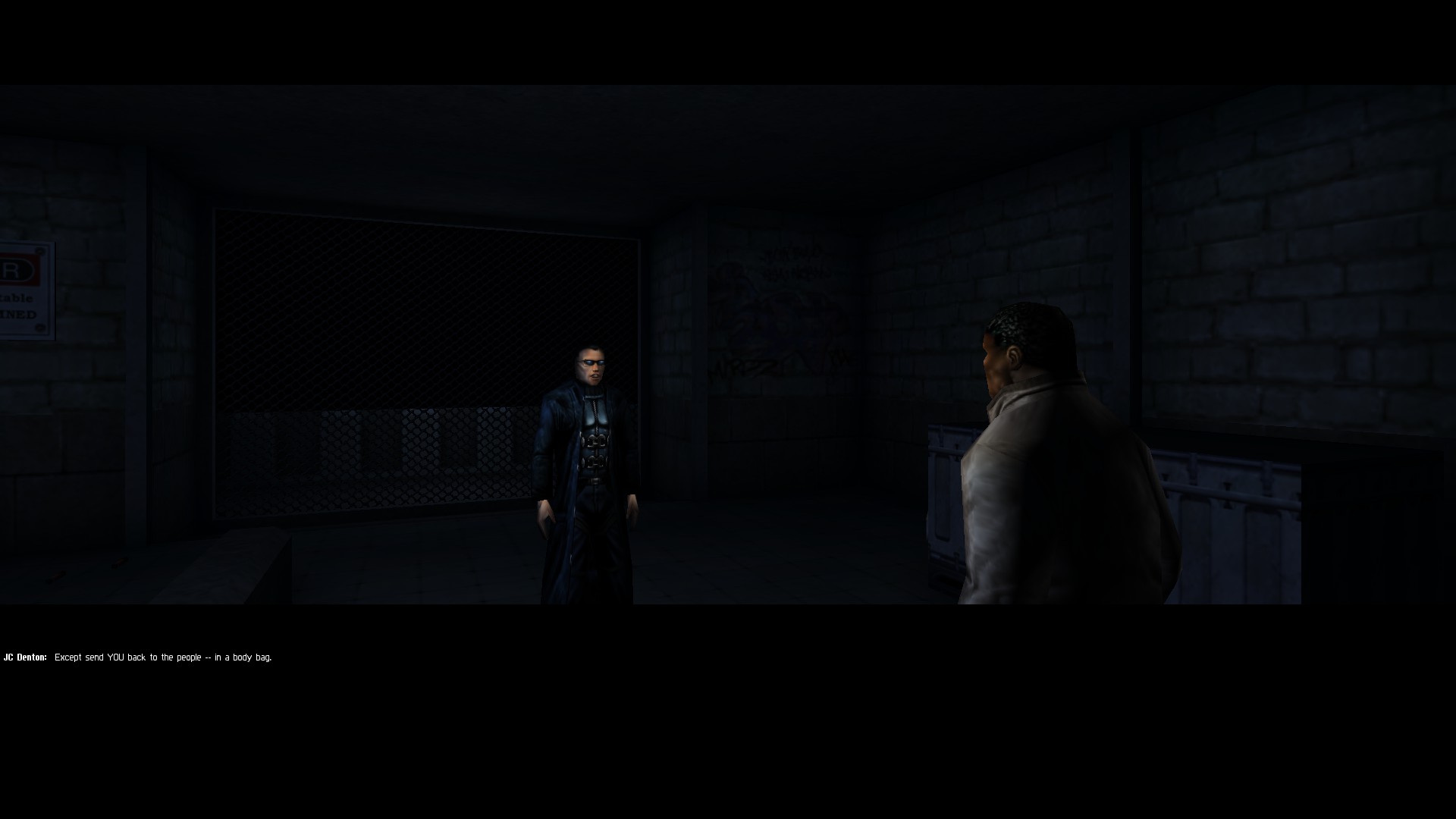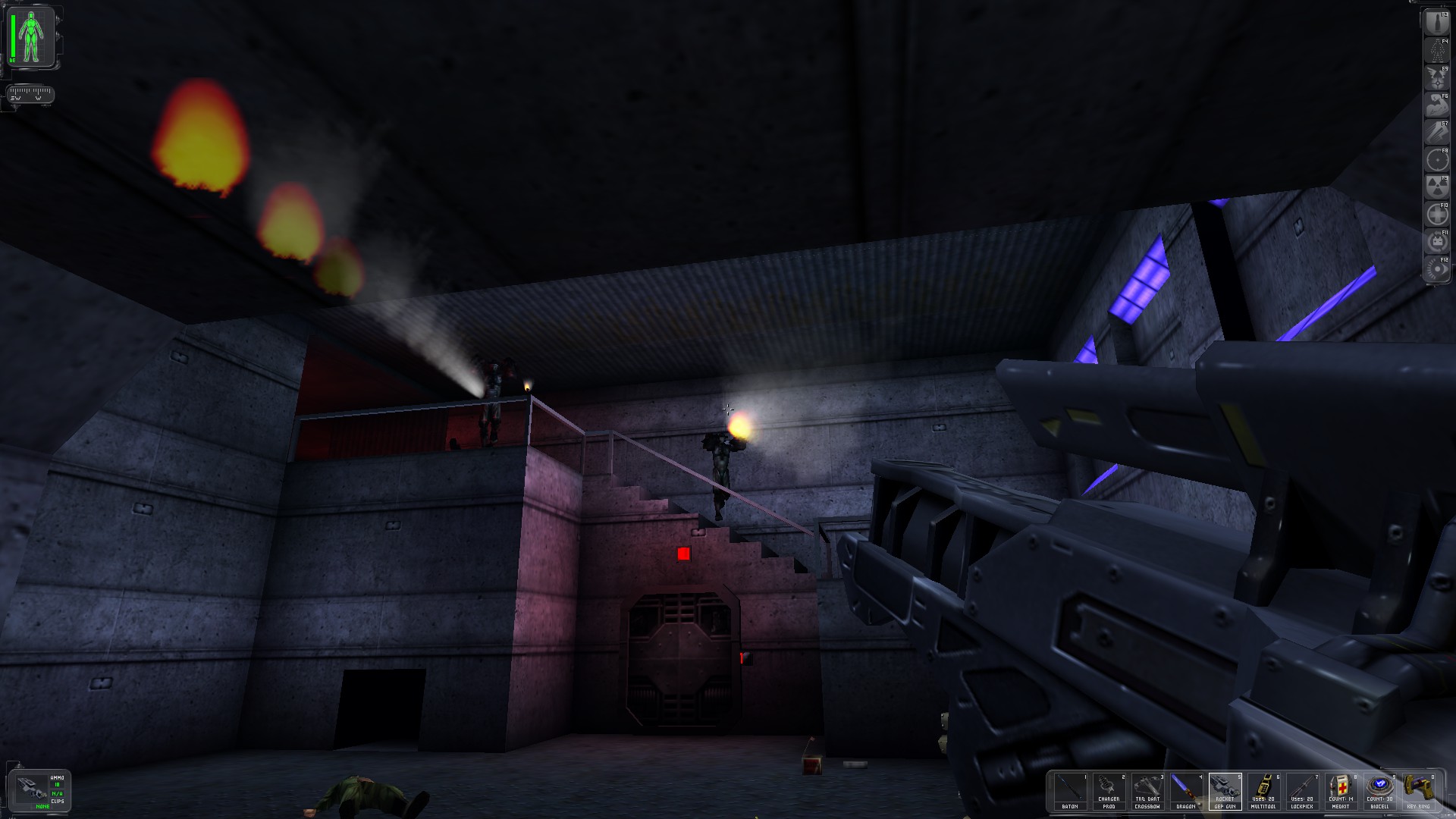The Story Integration of Deus Ex
Author: Vertette Filed under: Story design Posted: November 9, 2023 20:30:00
Whenever video game enthusiasts start spewing the fires of the classic "are video games art" discussion everywhere again, certain titles typically come up regularly: Mother 3, Shadows of the Colossus, Journey and such. If you include gaming journalists' opinions into that discussion, however, you get some other more experimental titles in the mix like Gone Home, Sunset and Where the Water Tastes Like Wine. This blogpost won't delve into the many arguments over whether games count as art and what even counts as a game, as you've undoubtedly read them a million times before, but what is interesting is that a lot of those experimental arthouse games that typically focus on telling a story are not the best examples of utilizing the medium to tell a story.
Borrowing the lexicon from my pretentious art teacher for a bit, the raison d'être of a video game is, simply put, to be interacted with. Therefore, it only makes sense that the best examples of telling a story through a video game would use their gameplay to do so, yet this is what many designers tend to forget. Both story-heavy indie and AAA games make mistakes like failing to integrate the story and gameplay well, neglecting the gameplay - either occasionally or almost entirely - or railroading players so hard that the game might as well play itself. This isn't so much because the designers of these games don't want you to play their work, but because it's hard to tell a specific story when the player can break it in numerous ways. Emil Pagliarulo once somewhat infamously claimed that the designer wants to tell a story and the player wants to rip it up to fold into paper airplanes and throw them around. So does that mean there's no good way to bridge the gap and tell a story through a game in a way that lets you tell the story you have in mind while still handing over some authorship to the player? Absolutely not, and there are several good examples of games that prove as much, but the one I want to highlight in particular is the original Deus Ex. Not so much because of its quality of writing, which is rightly legendary, but what it does even better is how the game tells its story.
 JC Denton isn't a very good debater, but his one-lines are so memorably written and performed that they achieved Internet fame anyway. "Do you have a single fact to back that up" is a favorite of mine.
JC Denton isn't a very good debater, but his one-lines are so memorably written and performed that they achieved Internet fame anyway. "Do you have a single fact to back that up" is a favorite of mine.
Deus Ex tells the story of JC Denton, an employee of international anti-terrorist organization UNATCO, as he blows the lid off a massive government conspiracy and heads deeper into the rabbit hole of conspiracies to stop the people at the top of it from taking over the world. The story gives us many good reasons to travel across the world to see varying locales, from New York to Paris to Hong Kong, talking to various people with interesting viewpoints while exploring cities, underground tunnels and secret bases, resulting in a lot of variety at a steady pace. You will always visit the same locations and talk to the same people in the same order to advance the plot, but what makes the game so replayable is that the game constantly gives you choices. Not just in how you handle various obstacles in gameplay, but through the story as well, even if it's not always as obvious. The trick to it is that you're never given a choice too big to derail the game's narrative, but you do have plenty of small and medium-sized choices that result in varying permutations of said narrative (except for the endings, which are allowed to break away from it of course).
In Warren Spector's Deus Ex postmortem at GDC, he admits that a lot of the game's choices are "smoke and mirrors". That might be so, but it is a rather convincing set of smokes and mirrors. For example, before JC leaves his employer, almost all of your colleagues are invulnerable. That's definitely a cheat, but unlike what Bethesda games might have taught you, it's not necessarily a poor one. Choosing to kill them before there is any reason to do so isn't a choice most players would make unless they were deliberately messing around or trying to break the narrative on purpose. You can, however, ignore your objectives (frustrating your colleagues), kill innocent civilians (intentionally or not) and even harass the administrator in the bathroom, but the worst that will happen is that your boss threatens to fire you. You can never mess up badly enough to make that happen, but the way the game implemented these choices into its gameplay to make them feel natural, the acknowledgement of your choices by various characters causing them to have different opinions of JC and the frequency of these choices do make it feel like the world of Deus Ex is more believable than the world of even most modern AAA games.
 For some reason, the top class agent of an international anti-terrorist organization starts out with the aiming skills of a toddler. Luckily you don't need good aim to kill terrorists with rocket launchers.
For some reason, the top class agent of an international anti-terrorist organization starts out with the aiming skills of a toddler. Luckily you don't need good aim to kill terrorists with rocket launchers.
What definitely sells the illusion, however, are the more impactful choices you can make and the way they're handled. In the first major branching point of the game, JC has caught Juan Lebedev, a financial backer of the terrorists you're hunting down, in an airplane at his private airport terminal. He surrenders, citing a UNATCO policy against killing unarmed prisoners, before JC's colleague Anna Navarre walks into the room and orders him to execute Lebedev. In any lesser game, the presentation of this situation would've overemphasized every action you can take, which would make it feel artificial. In Deus Ex, these situations aren't presented as a choice at all. You can follow orders and shoot Lebedev in cold blood, and the game definitely feels like it's pressuring you into doing so, but you can also walk away. Or kill Anna. This isn't easy to do because she has a bad habit of exploding once dead, which can take out JC and Lebedev if not careful, but now that Anna has served her narrative purpose she's completely expendable. You can even stay one step ahead of her and put explosives at the entrance of the room which will kill her before she gets to make the execution order, and this even gets a unique line of dialogue from JC where he shifts the blame to Juan for the booby trap in the resulting argument with his boss. In games that use invulnerable NPCs for story reasons and where the primary way of interacting with it is through violence, turning God Mode off at the right time helps a lot to keep the player immersed.
Other such choices, like the fate of Paul, Smuggler and Gunther are handled in the same way with a complete lack of overemphasis, and this is what makes the choices feel so naturally integrated with gameplay. If you want to make a choice, you do it. As a result a lot of seemingly inconsequential choices you make can end up benefitting or hindering you later down the line, and the game keeps this up so well that you can replay it numerous times and still find yourself surprised by all the specific actions characters can react to. In that sense, you aren't so much changing the narrative as you are contextualizing it. You might not get a wildly different story every playthrough, but any time it feels like the game should let you take an obvious action it usually will. This way, Deus Ex can tell the story it wants while still letting the player make choices that feel impactful. Designing it this way means that choices can't actually be very impactful, but if the trick is executed well enough, most players won't even care because they'll be gushing over how detailed your game is for decades to come. There's a reason why "brb reinstalling Deus Ex" was such a popular meme before the days of cheap storage.
And some great writing helps too, of course.